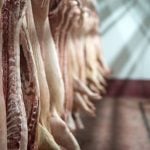Canada’s four western provinces say they’ve won a renewed interprovincial trade challenge against Ontario’s limits on products blending vegetable oils with dairy.
The challenge, launched in March and spearheaded by the Alberta government, is the first to be heard under a new Chapter 17 dispute resolution process for Canadian provinces’ Agreement on Internal Trade (AIT).
The new process has been seen as giving sharper teeth to the enforcement and compliance of AIT panel rulings.
An AIT summary panel has given Ontario until Feb. 1, 2011 to comply by ensuring that its policies are consistent with the AIT, the Alberta government said in a release Monday.
Read Also

China seeks improved ties with Canada amid rising trade tensions
China called on Friday for steps to improve bilateral ties with Canada, saying there were no deep-seated conflicts of interest, following a spike in trade tensions with many of Beijing’s Western trade partners this year.
If Ontario remains in breach, Alberta officials said, it could now face a cash penalty of up to $5 million.
Alberta and the supporting provinces had formally asked for the establishment of a summary panel to rule on whether regulations in Ontario’s Milk Act, and its restrictions on the sale of certain vegetable oil-blended dairy products, violated AIT.
Vegetable oils such as canola, sunflower and soya are often used to create blends of margarine and butter, as well as blended drinks such as soymilk.
The Saskatchewan government noted Monday that when the dispute began 10 years ago, the Vegetable Oil Industry of Canada (VOIC) estimated repeal of the Ontario legislation could lead to the development of a $225 million market for vegetable oil-blended dairy products containing 51 per cent vegetable oil.
“It is estimated the benefits today would be even greater,” the province said Monday.
The Ontario government offered no official comment Monday on the AIT panel’s decision.
“Oilseed production in Alberta is a significant and important part of our agriculture sector,” Alberta Agriculture Minister Jack Hayden said in a release. “This ruling provides an opportunity for both our producers and our processing industry as we regain access to the Ontario market.”
“Effective mechanism”
“As Saskatchewan led the negotiation of the new AIT dispute resolution rules, we are pleased to see the process at work and look forward to Ontario fixing the breach,” Jeremy Harrison, Saskatchewan’s minister for trade, said in his province’s release.
“This case highlights the importance of the West working together to champion the interests of our agriculture sector.”
Also, Manitoba Trade Minister Peter Bjornson said in a separate release, the panel findings show the AIT to be “reducing internal trade barriers and the dispute settlement procedures provide an effective mechanism for resolving disputes.”
According to a separate VOIC release Monday, the AIT panel’s decision upholds a 2004 AIT panel’s decision in favour of Alberta and B.C., with Manitoba and Saskatchewan as interveners.
But Ontario had “refused to comply with the (2004) panel’s findings,” the VOIC said.
Toronto-based VOIC said it had urged Alberta this spring to remount its challenge of the Ontario rules, because of recent amendments to the AIT boosting enforcement measures and allowing for monetary penalties.
VOIC quoted the new panel report released Monday as finding that the 2004 panel’s findings on economic injury to the vegetable oil industry “were legally and factually correct, and that the same kind of injury continues as a result of Ontario’s measures.”
“Consumers in Ontario now stand to benefit from new, healthful products in the spreads and beverage food category,” VOIC president Sean McPhee said in that group’s release Monday.
“In our view similar restrictions, maintained by any other government in Canada, are inconsistent with the (AIT) and should be immediately repealed.”
VOIC’s interest in the case is that of an overarching industry group for oilseed producers and processors, seed developers, suppliers of fats and oils and makers of edible-oil products such as margarine, shortenings, cooking oils, dressings and mayonnaise.
















